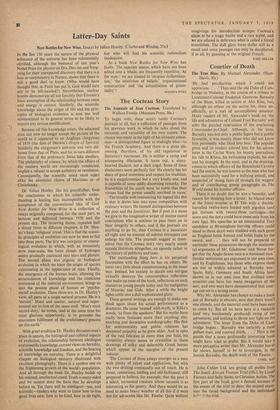Latter-Day Saints
New Bottles for New Wine. Essays by Julian Huxley. (Chatto and Windus, 21s.)
IN the last 150 years the nature of the physical substance of the universe has been substantially clarified, although the bestowal of last year's Nobel Prize for physics on Drs. Dao-lee and Ning- yang for their unexpected discovery that there is a bias or unsymmetry in Nature, shows that there is still a good deal to know. (Who would have thought that, as Pauli has put it, God would turn out to be left-handed?) Nevertheless, nuclear bombs demonstrate all too forcibly that Einstein's basic assumption of the relationship between mass and energy is correct. Similarly, the scientific knowledge about the origin of life and the prin- ciples of biological evolution is now too well substantiated in its general terms to be likely to require any serious modification.
Because all this knowledge exists, the educated man can now no longer accept the picture of the world as it appeared to an Anglican clergyman of 1859 (the date of Darwin's Origin of Species). Similarly the clergyman's universe was very dif- ferent from that of Plato, and his in turn different from that of the prehistoric Swiss lake dwellers. The philosophy of science, by which the affairs of the modern world are increasingly conducted, implies a refusal to accept authority or revelation. Consequently, the scientific mind must reject alike the absolutist claims of Marxism or of Christianity.
Dr. Julian Huxley, like his grandfather, finds the conclusions to which his scientific under- standing is leading him incompatible with the acceptance of the conventional idea of God. New Bottles for New Wine is a collection of essays originally composed, for the most part, as lectures and delivered between 1950 and the present day. The recurring theme, repeated half a dozen times in different chapters, is Dr. Hux- ley's basic 'religious' creed. This is that the scienti- fic principles of evolution can now be seen to fall into three parts. The first was inorganic or cosmo- logical evolution in which, with an immensely slow time-scale, the loose clouds of hydrogen atoms gradually coalesced into stars and planets. The second phase was organic or biological evolution in which we trace the origin of species culminating in the appearance of man. Finally, the emergence of the human brain, allowing the accumulation of knowledge and the conscious command of the material environment, brings us into the present phase of human or 'psycho- social' evolution. These three are, in Dr. Huxley's view, all parts of a single natural process. He is a 'monist.' Mind and matter, natural and super- natural are to him of the same stuff. 'Man's most sacred duty,' he writes, 'and at the same time his most glorious opportunity, is to promote the maximum fulfilment of the evolutionary process on this earth.'
With great erudition Dr. Huxley discusses man's place in nature, the biological and cultural aspects of evolution, the relationship between ideologies and scientific knowledge, current views on heredity, scientific knowledge and freedom, and the bearing of knowledge on morality. There is a delightful chapter on biological mimicry illustrated with excellent photographs. There is a sombre one on the frightening growth of the world's population. And all through the book Dr. Huxley builds up his rational, intellectual creed. Truth is many-sided and we cannot deny the facts that he develops before us. Yet there will be intelligent—yes, and scientific—readers who want to know how to live good lives now, how to be kind, how to do right, but who will find his scientific rationalism inadequate.
As a book New Bottles for New Wine has faults. The separate essays, which have not been edited into a whole, are frequently repetitive. As for style : we are treated to 'utopian millennium- ism,' the relativism of beliefs,' organizational construction' and 'the actualization of poten-










































 Previous page
Previous page